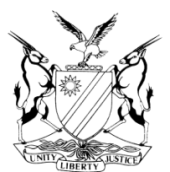REPUBLIC OF NAMIBIA

IN THE HIGH COURT OF NAMIBIA, MAIN DIVISION, WINDHOEK
RULING IN TERMS OF PRACTICE DIRECTION 61
Case Title: SEPE'S GENERAL ENTERPRISES CC PLAINTIFF and KAVANGO EAST REGIONAL COUNCIL 1stDEFENDANT RUNDU TOWN COUNCIL 2ND DEFENDANT MINISTER OF WORKS AND TRANSPORT 3RD DEFENDANT MINISTER OF EDUCATION, ARTS AND CULTURE 4TH DEFENDANT MINISTER OF FINANCE AND PUBLIC ENTERPRISES 5TH DEFENDANT MINISTER OF URBAN AND RURAL DEVELOPMENT 6TH DEFENDANT | Case No: HC-MD-CIV-ACT-OTH-2023/03679 INT-HC-SUMJUD-2023/00364 | |
Division of Court: Main Division | ||
Heard on: 17 November 2023 | ||
Heard before: Honourable Lady Justice Rakow | Reasons delivered on: 8 December 2023 | |
Neutral citation: Sepe's General Enterprises CC v Kavango East Regional Council (HC-MD- CIV-ACT-OTH-2023/03679) [2023] NAHCMD 807 (8 December 2023) | ||
Order: | ||
| ||
Reasons for order: | ||
RAKOW J : Background
Parties
Claim
Arguments Plaintiff
Defendants
Legal considerations
‘Where the defendant has delivered notice of intention to defend, the plaintiff may apply to court for summary judgment on each claim in the summons, together with a claim for interest and costs, so long as the claim is – (a) on a liquid document; (b) for a liquidated amount in money; (c) delivery of a specified movable property; or (d) for ejectment.’
‘[8] In Gulf Street (Pty) Ltd v Rack – Rite Bop (Pty) Ltd and Another 1998 (1) SA 679 (OPD) at 683 G – 684B the following appears: “In the matter of Northern Cape Scrap & Metals (Edms) Bpk v Upington Radiators & Motor Graveyard (Edms) Bpk 1974 (3) SA 788 (NC) at 793 C – D the learned judge quotes with approval: “It will therefore be seen that summary judgment is an extra ordinary and drastic remedy. It shuts the mouth of the defendant finally. A party who seeks to avail himself of this drastic remedy must in my view strictly comply with the requirements of the Rule.” In view of the nature of the remedy the Court must be satisfied that a plaintiff who seeks summary judgment has established its claim clearly on the papers and the defendants have failed to set up a bona fide defence as required in terms of the Rules of this Court. There are accordingly two basic requirements that the plaintiff must meet namely a clear claim and pleadings, which are technically correct before the Court. If either of these requirements is not met, the Court is obliged to refuse summary judgment. (my emphasis) In fact, before even considering whether the defendant has established a bona fide defence, it is necessary for the Court to be satisfied that the plaintiff’s claim has been clearly established and its pleadings are technically in order. Even if a defendant fails to put up any defence or puts up a defence, which does not meet the standard required of a defendant to resist summary judgment, summary judgment should nevertheless be refused if plaintiff’s claim is not clearly established on its papers and its pleadings are not technically in order and in compliance with the Rules of Court. (See also Dowson & Debson Industrial Ltd vs Van der Werf and Others 1981 (4) SA 417 (CPD) at 424 F – 427 A).’
‘(a) The resolution of summary judgment does not entail the resolution of the entire action i.e., the defendant is required to set out facts which if proved at trial would constitute a defence. The upshot of this is that the court is required to refuse summary judgment even though it might consider that the defence will probably fail at the trial. (b) The adjudication of summary judgment does not include a decision on factual disputes. This means that the court should decide the matter from the assumption or premise that the defendant’s allegations are correct. For that reason, summary judgment must be refused if the defendant discloses facts which, excepting the truth thereof, or if proved at trial, will constitute a defence. (c) Because summary judgment is an extraordinary remedy, it should be granted only where there is no doubt that the plaintiff has an unanswerable case. . . . (e) The court is not bound by the manner in which the defendant presents its case. This is to mean that if the defendant files an opposing affidavit that discloses a triable issue, the defendant should, on that account, be granted leave to defend the action. . . . (g) Summary judgment must be refused in the face of any doubt arising as to whether or not to grant it. The basis for this rule is that an erroneous finding to enter summary judgment is heralds more debilitating consequences for a defendant than a plaintiff. This is because any error committed in refusing summary judgment may be dealt with during the substantive trial. In this regard therefore, leave ought ordinarily to be granted unless the court is of the opinion that the defendant has a hopeless case.’ Discussion
Order
| ||
Judge’s signature | Note to the parties: | |
RAKOW J Judge | Not applicable | |
Counsel: | ||
PLAINTIFF: | DEFENDANTS : | |
R Walters Of Adv. SS Makando Chambers, Windhoek. | J Ncube Of Government - Office of the Government Attorney, Windhoek. | |
1 Namibia Airports Company Limited v Conradie 2007 (1) NR 375 (HC) para 22 pg 5-7 at para 8
2 First National Bank of Namibia Limited v Louw (I 1467-2014) [2015] NAHCMD 139 (12 June 2015).